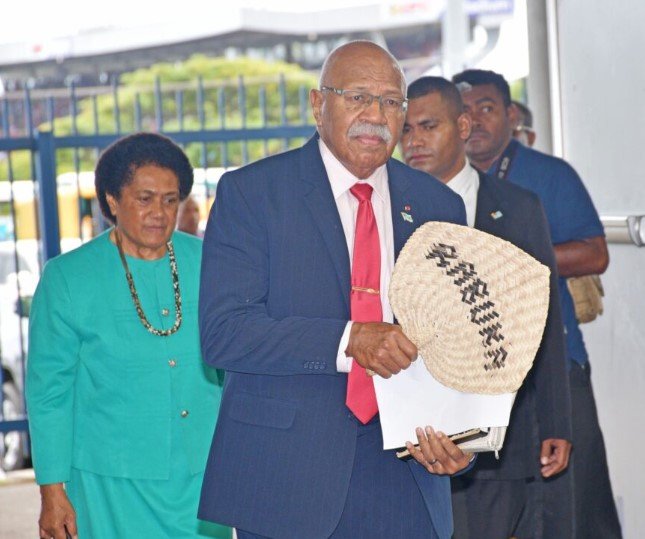Fiji Prime Minister Sitiveni Rabuka inaugurated his country’s new embassy in Jerusalem on September 17, 2025, during an official visit to Israel. This move, attended by Israeli Prime Minister Benjamin Netanyahu, makes Fiji the seventh nation to establish a diplomatic mission in the city, sparking both praise and criticism amid ongoing global tensions.
Historic Ceremony Strengthens Ties
The opening ceremony took place in Jerusalem’s Har Hotzvim neighborhood. Rabuka and Netanyahu shared warm words, highlighting shared values and long-standing relations between the two nations.
Rabuka called the event a milestone that builds bridges between cultures. He noted Fiji’s religious ties to Jerusalem as the birthplace of Christianity, which resonates deeply with many Fijians.
Netanyahu praised Fiji for recognizing Jerusalem as Israel’s capital for over 3,000 years. He described the two leaders as brothers committed to mutual support.

This step follows Fiji’s decision earlier in 2025 to relocate its embassy from Tel Aviv. It aligns with similar moves by countries like the United States and Papua New Guinea.
Global Reactions and Controversy
The embassy opening has drawn mixed responses worldwide. Supporters see it as a bold affirmation of Israel’s claims, while critics argue it violates international law.
Palestinian officials condemned the decision as an assault on their rights. They urged Fiji to reverse course, citing United Nations resolutions that view East Jerusalem as occupied territory.
Several nations, including those in the European Union, maintain embassies in Tel Aviv to avoid endorsing Israel’s annexation of Jerusalem in 1980.
Despite the backlash, Fiji stands firm. Rabuka defended the choice as a government decision rooted in the 1990s, emphasizing Fiji’s sovereign right to shape its foreign policy.
- Key critics include the Palestinian Ministry of Foreign Affairs, which called the move a blatant violation of global norms.
- Supporters, such as Israeli officials, hailed it as a moral and historic step forward.
Broader Implications for Pacific Diplomacy
Fiji’s action comes amid its push for an Ocean of Peace initiative at the Pacific Islands Forum in late August 2025. This proposal aims to promote stability in the region but faces scrutiny over militarization concerns.
By aligning closer with Israel, Fiji signals a shift in its international stance. This could enhance cooperation in areas like technology, agriculture, and security.
Experts note that small island nations like Fiji often seek strong partners to address climate change and economic challenges. Israel has offered aid in water management and renewable energy to Pacific countries.
However, the move risks straining relations with Arab nations and others sympathetic to Palestine. It highlights the complex balancing act in global diplomacy for developing states.
The table below outlines nations with embassies in Jerusalem as of September 2025:
| Country | Year Embassy Opened |
|---|---|
| United States | 2018 |
| Guatemala | 2018 |
| Honduras | 2021 |
| Kosovo | 2021 |
| Papua New Guinea | 2023 |
| Czech Republic | 2024 |
| Fiji | 2025 |
Economic and Cultural Exchanges on the Horizon
The new embassy opens doors for deeper bilateral ties. Discussions during Rabuka’s visit focused on education, health, and innovation exchanges.
Fiji could benefit from Israeli expertise in cybersecurity and farming techniques suited to island environments. In return, Israel gains a foothold in the Pacific, a region of growing strategic importance.
Cultural links were evident at the ceremony, with traditional Fijian garlands worn by both leaders. Such gestures underscore the personal dimension of diplomacy.
This development ties into recent events, like the United Nations General Assembly in September 2025, where Pacific leaders addressed global peace amid conflicts in the Middle East and elsewhere.
Challenges Ahead in a Divided World
While the embassy boosts Fiji-Israel relations, it occurs against the backdrop of the ongoing Gaza conflict. United Nations reports from 2025 estimate over 65,000 Palestinian deaths, with accusations of genocide leveled at Israel.
Rabuka’s government insists the move promotes peace, not division. Yet, domestic critics in Fiji question if it aligns with the nation’s values of neutrality.
International observers watch how this affects Fiji’s role in forums like the Commonwealth and the United Nations. It may influence other Pacific nations considering similar steps.
As global debates continue, this embassy serves as a reminder of Jerusalem’s contested status. It prompts questions about how small nations navigate power dynamics between major players.
Share your thoughts on Fiji’s diplomatic move in the comments below, and pass this article along to spark discussions with friends.
